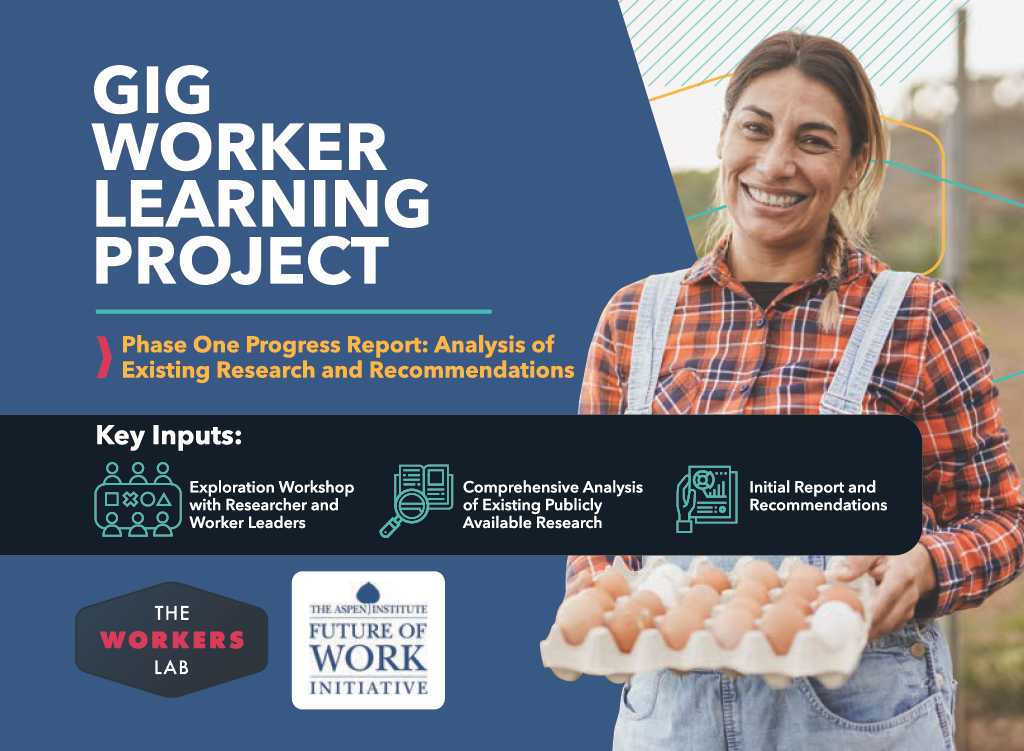Gig Worker Learning Project: Phase One Report
Gig Worker Learning Project
Phase one progress report
The Gig Worker Learning Project is a valuable resource for anyone seeking to better understand gig workers and the challenges they face.
For several years now, the conversation about gig work and the future of work has been hampered by the lack of good data. That’s why we’re thrilled that Sol Center’s first grant supports the Gig Worker Learning Project, a participatory research project by The Workers Lab and the Aspen Institute Future of Work Initiative, seeking to understand gig workers’ needs and the solutions that will impact them most.
The first phase of the project, which took place over 2022, included early stakeholder outreach and a landscape scan of existing gig workers research. The Gig Worker Learning Project published its findings from that analysis in February 2023, and considers several questions, such as:
- What is the “Gig Economy”?
- What are gig workers doing to make money?
- Who are gig workers?
- How do digital platforms affect the experiences of gig workers?
- How are gig workers using their incomes?
- What kinds of benefits and protections exist for gig workers?
This is a valuable resource for anyone seeking to better understand gig workers and the challenges they face, and definitely worth a read!
The Other Side of the Storm
The Other Side of the Storm
What do Black immigrant domestic workers in the time of COVID-19 teach us about building a resilient care infrastructure?
Kim Freeman Brown, Marc Bayard
Presented by The Institute for Policy Studies in partnership with
National Domestic Workers Alliance (NDWA) We Dream In Black Program
If we hope to build protections that support all workers, we need to understand the challenges faced by those most excluded from our current systems of support.
We’ve been closely following the work of the National Domestic Workers Alliance’s We Dream in Black initiative. Their most recent research and report highlights the experiences and priorities of domestic workers who are Black, immigrant women. The findings highlight how important an intersectional lens is to designing and delivering benefits and protections for all.
If we hope to build protections that support all workers, regardless of their job, identity, or ability, then we need to understand the challenges faced by those excluded from our current systems of support, and most importantly, the solutions they say they want.
Arts Workers in California
Arts Workers in California
Creating a more inclusive social contract to meet arts workers' and other independent contractors' needs
This report outlines the working arrangements of California’s arts workers and sheds new light on the challenges and issues they face, particularly when working as independent contractors.
The Center for Cultural Innovation, with support from the William and Flora Hewlett Foundation, commissioned the Arts Workers in California report to help arts advocates, labor advocates, and policy makers create more inclusive systems that expand protections and benefits for all types of workers.
The report outlines the working arrangements of California’s arts workers and sheds new light on the challenges and issues they face, particularly when working as independent contractors. It also identifies policy shifts to update systems, for those in California or nationally, that could be more inclusive of artists and those who similarly operate outside the traditional bounds of employment. Such protections include collective bargaining power for all types of workers, access to health insurance, family leave, anti-discrimination, and savings toward retirement.
In many ways, this report is the founding document that underpins Sol Center’s work. It’s worth a read!


